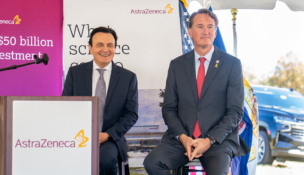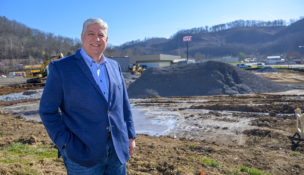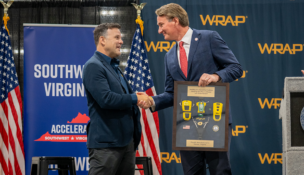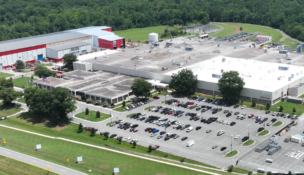Stars in their eyes
Roanoke Valley sees robust, diverse economic growth
Beth JoJack //October 27, 2020//
Stars in their eyes
Roanoke Valley sees robust, diverse economic growth
Beth JoJack //October 27, 2020//
When 19th-century movers and shakers picked sleepy Roanoke as the site of the crossroads linking the Shenandoah Valley and Norfolk & Western railroads, the town grew with such force and speed that it earned the now-obscure nickname “Magic City.”
Over the decades that followed, thousands of Roanokers toiled for the N&W one way or another. Between 1884 and 1953, workers at Roanoke’s Locomotive Shop built a whopping 447 locomotives, according to local historian and former Norfolk Southern Railway employee Wayne McKinney.
Sadly, though, every party winds down sometime.
Norfolk Southern was created by the 1982 merger of Norfolk & Western and Southern Railway, and the new company shifted its headquarters from Roanoke to Norfolk. By 2000, a writer for The Washington Post described Roanoke as a “gritty former railroad town” (an insult that rankles Roanoke loyalists to this day).
“Clearly, it was obvious — and we probably even came to the realization a little late —that we shouldn’t have our eggs all in that basket,” says Beth Doughty, executive director of the Roanoke Regional Partnership.
These days, the Roanoke Valley — which includes the cities of Roanoke and Salem as well as Botetourt, Franklin and Roanoke counties — boasts an economy built on a wide range of industries, including robust sectors in health care, transportation manufacturing, technology and advanced manufacturing.

“We’ve really tried to diversify the economy,” says Marc Nelson, economic development manager for the city of Roanoke. “That just makes sense for any city or any region to focus on having a broad range of different [businesses].”
A cluster of outdoor recreation businesses also call this region home. That didn’t happen by chance.
In the late aughts, the Roanoke Regional Partnership began working to brand the region as a mecca for outdoors enthusiasts, with the hope of attracting a precious commodity: top professional talent. “I always say talent is the currency of the 21st century,” remarks Doughty.
In 2009, Pete Eshelman joined the partnership as its new director of outdoor branding. Not long after being hired, Eshelman forged partnerships with businesses and local governments to launch its first annual fall outdoors festival in 2011. Since then, the festival has grown each year. More than 35,000 people turned out in 2019 for what is now called the Anthem Roanoke GO Outside Festival.
That branding effort paid dividends. The Roanoke region enjoyed a 38% growth in outdoor sector employment between 2010 and 2019, Doughty says. And in 2017, Men’s Journal magazine named Roanoke as one of the 20 best mountain towns in America, alongside places such as Park City, Utah, and Crested Butte, Colorado.
“We’re an outdoors town,” says Doughty, who will retire in December after more than two decades at the helm of the partnership. “Our outdoor assets are strong enough to brand the region.”
Strong enough, Doughty hopes, to woo remote-working professionals who can live anywhere to relocate to the Star City, as Roanoke is known these days. (The modern nickname is derived from the landmark, 88.5-foot-tall, neon Roanoke Star on Mill Mountain).
The staff at the partnership paid attention when experts began predicting the coronavirus might cause big-city dwellers to flee in large numbers for suburban or rural areas where there’s room to spread out. This spring the partnership launched a digital campaign dubbed “Live Here, Work Anywhere, Play Everywhere,” which touts Roanoke’s outdoor amenities and low cost of living.
“It’s been much more successful than I think we anticipated,” Doughty says of the campaign. “So that’s an opportunity for us as a community.”
Health care renaissance
Another benefit for the Roanoke Valley is Carilion Clinic’s rapidly expanding footprint in the region. “There’s lots going on there,” Doughty says.
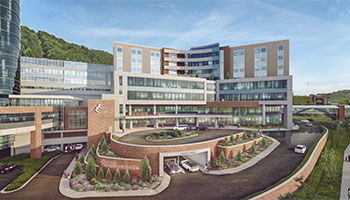
A study released this year by the University of Virginia’s Weldon Cooper Center for Public Service reported that Carilion Clinic generated more than $3.2 billion in economic impact and 24,000 jobs in the commonwealth in 2018.
In 2019, Carilion Clinic announced plans for an ambitious $500 million, five-year expansion at Roanoke Memorial Hospital, making it one of the largest hospitals in the state. Among the plans: a new tower, which will offer parking, an expanded emergency department and floors for heart and vascular services, as well as a new nearby building for the hospital’s psychiatry and behavioral medicine department.
“It’s got an opportunity to impact the city in a major way,” Nelson says. “It’s going to transform how that area of town looks. … It’s going to bolster lots of the services that are provided in the region. The cardiac center, the expanded emergency room, all those things I think are really going to be really helpful for us as we grow as a region.”
Within walking distance from Roanoke Memorial sits the Virginia Tech Carilion (VTC) School of Medicine and the Fralin Biomedical Research Institute, both established in 2010.
Since the inception of the Fralin Biomedical Research Institute, it has been awarded $195 million in cumulative grants and contracts, according to John Pastor, the institute’s spokesperson. Researchers there now have more space to spread out because the institute opened a new 140,000-square-foot addition this summer. They also have access to a Bruker BioSpec 94/20 USR MRI research scanner. Installed at the institute in June, it is more powerful than any other scanner in the region.
“High-impact advances in science and medicine often accompany innovations in technology,” said Michael Friedlander, vice president for health sciences and technology at Virginia Tech and executive director of the research institute, in a statement. “With tools like this high-powered MRI that is coupled with a unique MR-guided positron emission tomography (PET) system, our teams can interrogate rodent models of human disease conditions, such as cancer, heart disease and brain disorders, at an unprecedented level of resolution and sensitivity and inform potential treatments and preventions.”
A new truck line
Adding to the region’s economic strength, medium duty Mack Trucks began rolling off the production line at the company’s new Roanoke Valley Operations facility on Sept. 1.
A fresh addition to the Mack menu, the Mack MD Series includes the Mack MD6, a Class 6 truck with a gross vehicle weight rating of 25,995 pounds, and the MD7, a class 7 truck with a GVWR of 33,000 pounds. “The durability and the ruggedness that you’ve come to expect from Mack Trucks, you will also find at the same level within our medium duty products,” Jonathan Randall, Mack Trucks’ senior vice president of North American sales and commercial operations, said during a Sept. 22 virtual media event about the series.
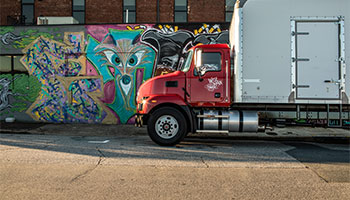
Mack Trucks, part of the Volvo Group, invested $13 million in the 280,000-square-foot manufacturing space, located in the Glenvar area of Roanoke County. The company also committed to creating 250 jobs in Roanoke by February 2021. By the end of September, about 140 workers were already employed at the facility, says Mack Trucks spokesperson Christopher Heffner.
As Mack executives went about selecting the site for the new medium duty operation, they zeroed in on Roanoke County. “It’s a great central location, already within our manufacturing footprint along the I-81 corridor,” Randall says of the new facility. “Our suppliers are already there. They’re already coming through those areas to deliver.”
Mack’s Roanoke Valley facility sits about 45 miles from sister company Volvo Trucks North America’s factory in Dublin, which builds heavy duty trucks.
Even after working in local government for three decades, Jill Loope, Roanoke County’s director of economic development, still got butterflies in her stomach while working to land Mack Trucks. “These things don’t happen every day,” says Loope. “These types of projects — they’re rare.”
As far as she can tell, Loope says, the Mack MD Series is the first prototype-to-production automotive manufacturing operation in the commonwealth. “This is the first to actually be invented, created, developed and produced in Virginia, start to finish,” she says. “And that’s pretty exciting because the innovation occurred here.”
To help lure Mack Trucks to the Glenvar site, Roanoke County offered the company $700,000 in incentives, matching a grant from the state government’s opportunity fund. Additionally, the Virginia Economic Development Partnership’s Virginia Jobs Investment Program will assist with employee training. Positions at the Mack facility pay an average wage of $42,200, according to Loope.
“Not only does it bring hundreds of new jobs,” Loope says of the Mack facility, “it also bolsters our existing supplier base in the region and brings with it the opportunity for new supplier companies to locate here. So, the growth potential long-term for this company is enormous.”
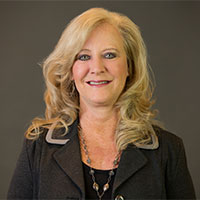
In this case, “enormous” means having an estimated annual economic impact of $364.17 million, according to an analysis by the partnership, which also predicts the Roanoke Valley facility will spur the creation of 594 secondary jobs.
“It’s been phenomenal for the county and for the region,” Loope says of the Mack Trucks project. “It’s really elevating the regional footprint in a global marketplace because it’s such a well-known brand.”
a


